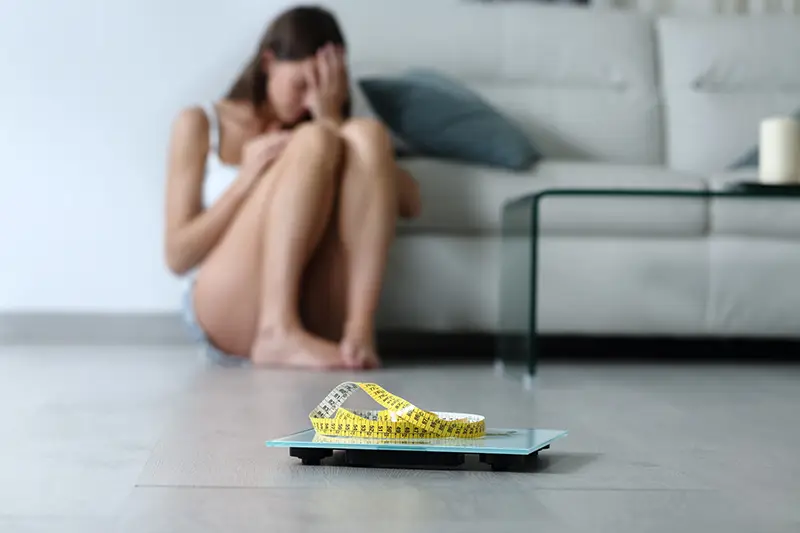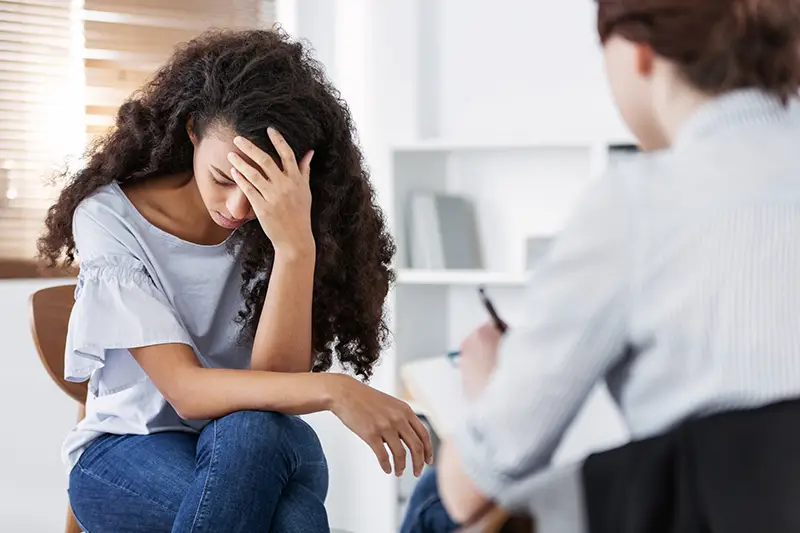Do you struggle with negative thoughts and emotions about food and eating?
What about constantly obsessing over the way you look and comparing your body to others?
Do you tell yourself that you will be better off at a certain “goal” weight, but once you reach that number on the scale, it still feels like it’s not good enough?

If you answered yes to any of these questions, I’m sure you’re exhausted dealing with these concerns. The good news is that you don’t have to live with these struggles anymore…it’s time for change.
It’s time to free yourself from your eating disorder.

You are so strong.
Being able to admit that you need help with your eating disorder shows so much strength.
The first session with your therapist will focus on an in-depth assessment of your eating behavior history, medical history, co-occurring mental health concerns, family history, and goals for therapy. Our therapists truly want to get to know you and your unique story.
Following the initial session, you will collaborate with your therapist to create a personalized treatment plan, at which point it might be recommended that you visit a primary care physician, dietician, and/or psychiatrist as part of your treatment team.
Our focus at SMPG is to make sure you get the most optimal and comprehensive care that you need, so we will also discuss if outpatient treatment is the best option for you at this time. It is important to note that the number of sessions needed often differs from patient to patient. We will work together to monitor your progress and symptoms and determine the best course of action that fits your individual needs.
This process won’t always be easy, but you will have support every step of the way.
During your sessions with your therapist, you will learn how to make peace with food and eating, understand where your triggers come from, build your self-esteem and learn how to improve your body image.
We will also explore the root causes of your disordered eating patterns, identify new coping skills that will allow you to increase your ability to manage your emotions and stressors without the need to rely on eating disorder behaviors, and most importantly, you will learn how to accept your flaws and love yourself.
You so deserve to feel what it feels like to love and accept yourself.
Eating Disorder and Related Resources
We usually recommend some form of reading and use of the resources below to supplement therapy and facilitate progress.
General Eating Disorder Resources
Academy for Eating Disorders: The AED is the main international scientific body for the study and prevention of eating disorders. It provides professional training to therapists as well as education and information about eating disorders research, prevention, and clinical treatments.
National Eating Disorders Association: This non-profit organization specifically focuses on supporting individuals and families affected by eating disorders
Gurze/Salucore Eating Disorders Resource Catalogue: Eating disorder books, articles, information, resources, and more.
Verywell Mind Eating Disorders: This site provides articles about eating disorders, many of which have been written by Dr. Muhlheim.
Life Without Ed: How One Woman Declared Independence from Her Eating Disorder and How You Can Too, by Jenni Schaefer and Thom Rutledge. In her recovery, which is summarized in the book, Jenni Schaefer personified the eating disorder as “Ed,” an abusive boyfriend and explains how she broke up with him.
Cognitive Behavioral Approaches to Eating Disorders
Overcoming Disordered Eating – Part A and Part B. These online workbooks, provided by CCI, can be used by patients undergoing cognitive behavioral therapy for eating disorders.
The Body Image Workbook: An Eight-Step Program for Learning to Like Your Looks, Thomas P. Cash, Ph.D. (2008).This workbook specifically targets negative body image issues using a cognitive-behavioral approach.
The Appetite Awareness Workbook: How To Listen to Your Body & Overcome Bingeing, Overeating, & Obsession with Food, Linda W. Craighead, Ph.D (1996). This cognitively-based workbook focuses on strategies to regain normal eating patterns by reducing eating in response to external cues and emotional factors and increasing awareness of internal hunger and satiety signals.
Intuitive Eating: A Revolutionary Program That Works, 4th Ed., Evelyn Tribole and Elyse Resch (2020). This book teaches techniques to develop a healthy relationship with food and replace both dieting and binge eating with “intuitive eating.” This book is extremely helpful for chronic and yo-yo dieters and emotional eaters/binge eaters. The companion website, Intuitive Eating, provides an overview of the principles and other resources.
50 Ways to Soothe Yourself Without Food, Susan Albers, Psy.D. (2009). This book draws upon a variety of evidence-based techniques to cope with emotional eating. The techniques are divided into 5 sections: 1) Mindful meditation techniques; 2) Change your thoughts, change your eating; 3) Soothing sensations to calm and relax the body; 4) Soothing yourself with distractions; and 5) Soothing yourself with emotional relationships.
Mindful Eating: A Guide to Rediscovering a Healthy and Joyful Relationship with Food, Jan Chozen Bays, MD (2009). This book and accompanying CD, written by a pediatrician/zen master, provides exercises and meditations to teach mindful eating strategies.
Cognitive-Behavioral Therapy for Avoidant/Restrictive Food Intake Disorder: Children, Adolescents, and Adults, Kamryn Eddy, PhD and Jennifer Thomas, PhD (2019). This treatment manual provides an excellent psychoeducational overview of ARFID as well as describes the treatment. A companion workbook is available online.
For Parents of Children and Teens with Eating Disorders
Families Empowered and Supporting Treatment of Eating Disorders (F.E.A.S.T.) is an international nonprofit organization of and for parents and caregivers to help loved ones recover from eating disorders by providing information and mutual support, promoting evidence-based treatment, and advocating for research and education to reduce the suffering associated with eating disorders.
Around the Dinner Table is a support forum, run by F.E.A.S.T., for parents and caregivers of anorexia, bulimia and other eating disorder patients.
Maudsley Parents This website for parents of eating-disordered children provides support and a great deal of information about Family-Based Treatment.
Help Your Teenager Beat an Eating Disorder, Second Edition, James Lock, MD, Ph.D. and Daniel Le Grange, Ph.D. (2015). This book for parents includes a comprehensive overview of the Family-Based Treatment approach to treatment, written by the developers of the treatment.
Eating with Your Anorexic: A Mother’s Memoir, Laura Collins (2014). Any parent who is struggling with a child with an eating disorder will find it helpful to read this mother’s account of her daughter’s recovery using Family-Based Treatment.
Brave Girl Eating, Harriet Brown (2010). Brown provides another excellent account of a family’s struggle with anorexia and treatment using Family-Based Treatment.
International Eating Disorder Parent Support is a Facebook support group for adults who care, or have cared for a loved one with an eating disorder. They provide peer-to-peer sharing, support, education, guidance, encouragement, and to offer HOPE. They are moderated by an international collective of parents whose children have been diagnosed with an eating disorder.
Video and audio resources: helping parents to help their child eat and be well: Parent Eva Musby has created video and audio resources for parents supporting children in recovery from an eating disorder. She has a 7-minute audio guided compassion meditation for parents that is great to use for getting in a good space to support a child. Check out her other offerings as well and her book, Anorexia and Other Disorders, which helps parents support their children in the most compassionate way.
Medical Consequences of Eating Disorders
Sick Enough: A Guide to the Medical Complications of Eating Disorders Dr. Jennifer Gaudiani has written the go-to resource on the medical complications of eating disorders. In her compassionate bedside manner, she demystifies these confusing disorders and distills into a single source everything that patients, families, and eating disorder providers will want to know.
AED Medical Care Standards Guide Often referred to as, “the purple brochure,” this guide from the Academy for Eating Disorders’ (AED) Medical Care Standards Task Force, is intended as a resource to promote recognition of, and risk management in the care of, those with eating disorders.
Anorexia, malnutrition and your bones Podcast by Jennifer Gaudian, MD, interviewed by Tabitha Farrar. Because the risk to bone health in teens with restrictive eating disorders is so significant and so often misunderstood, we highly recommend listening to this podcast.
Relaxation, Mindfulness, and Meditation Recordings
The Center for Mindful Eating offers free mindful eating meditations.
Eating disorder therapist Jennifer Rollin, LCSW has a Body Gratitude Meditation.
Cognitive Therapy Workbooks
Mind Over Mood: Change How You Feel by Changing the Way You Think, Dennis Greenberger, Ph.D. and Christine Padesky, Ph.D., Second Edition (2015). This cognitive therapy workbook can be used alone or in conjunction with therapy. It includes worksheets and teaches strategies for monitoring mood, challenging dysfunctional thoughts, and building new core beliefs.
Center for Clinical Interventions: These free downloadable Cognitive Therapy workbooks, courtesy of the Australian government, target a variety of problems including depression, social phobia, generalized anxiety disorder, panic disorder, low self-esteem, procrastination, bipolar disorder, perfectionism, and eating disorders. They can be used alone or in conjunction with therapy.
Books
Health at Every Size: The Surprising Truth About Your Weight by Linda Bacon was the first book to introduce that you did not have to be thin to be healthy.
Body Respect by Linda Bacon and Lucy Aphramor is the follow-up book to Bacon’s original writing on Health at Every Size. This book has a stronger focus on social determinants of health and the social justice component that is not addressed in the original book.
Body of Truth by Harriet Brown, a science journalist, presents how research has been manipulated, big pharma’s desire to make money, and what we think we know about health and weight is wrong along with practical suggestions on how to make peace with ourselves.
Things No One Will Tell Fat Girls by Jes Baker is refreshingly honest and funny in her first book on rejecting fat prejudice and embracing body acceptance.
The Body Is Not An Apology by Sonya Renee Taylor started as a poem and developed into an online community. It is now a book too! Taylor creates a foundation and handbook on how to practice radical self-love amidst the violence of systems of oppression.
You Have the Right to Remain Fat by Virgie Tovar is a super accessible examination of the origins of diet culture and a call to action to fight against it.
Articles
“Weight Science: Evaluating the Evidence for a Paradigm Shift” by Linda Bacon & Lucy Aphramor published in the Nutrition Journal in 2011 evaluates the evidence that supports using a weight-neutral approach to health rather than the current guidelines of weight loss for “overweight” and “obese” individuals.
“The Weight-Inclusive versus Weight-Normative Approach to Health: Evaluating the Evidence for Prioritizing Well-Being over Weight Loss” by Tracy Tylka et al. in the Journal of Obesity in 2014 reviews two different methods for patient care and public health for providing a non-stigmatizing approach to well-being.
Helping Children to Develop Healthy Body Image and Healthy Eating Habits
These are several books for parents that provide tips and strategies for improving self-esteem and body image in their children:
- I’m Like, So Fat: Helping Your Teen Make Healthy Choices about Eating and Exercise in a Weight-Obsessed World, Dianne Neumark-Sztainer, Ph.D. (2005)
- Real Kids Come in All Sizes, Kathy Kater, LICSW (2004).
- 101 Ways to Help Your Daughter Love Her Body by Brenda Lane Richardson and Elane Rehr (2001).
No Weigh!: A Teen’s Guide to Positive Body Image, Food, and Emotional Wisdom by Signe Darpinian, Shelley Aggarwal, & Wendy Sterling. The book is a teen-friendly guide to eating and body image. It covers important related topics like physical changes of puberty, understanding emotions, stress management strategies, and good sleep and exercise habits. It discusses body diversity and acceptance. Most importantly, it presents a non-diet approach to balanced eating in which all foods are allowed. This is such a critical message for teens.
The Full Bloom Podcast Body-positive parenting podcast and other resources by two eating disorder therapists.
Ellyn Satter Institute Ellyn Satter is a registered dietician and therapist and widely-recognized expert who has written extensively on the feeding of children. Her website provides a lot of information and her books are available to order.
Eating Disorders in Older Adults
The Diary Healer by June Alexander. June Alexander is a writer who recovered from a long eating disorder in her 60s. Her story and other resources are featured on her website, a podcast, and a book.
Podcasts
Food Psych with Christy Harrison is a podcast focused on helping you make peace with food and your body. Christy Harrison, MPH, RD, CDN, interviews leaders in the body positivity and Health at Every Size® movements.
The Love, Food Podcast with Julie Duffy Dillon is a podcast for anyone with a complicated relationship with food who wants a different approach. Julie Duffy Dillon, RD, answers a letter each week that a listener has written to food wanting answers.
The Mindful Dietitian with Fiona Sutherland is a podcast predominately for dietitians and nutritionists who want to promote peace with food and bodies while stepping away from diet culture. Fiona Sutherland is an Australian dietitian who teaches other professionals about the non-diet approach and improving body image internationally.
Dietitians Unplugged with Glenys Oyston and Aaron Flores is a podcast exploring the ideas of health wellness from a new perspective that doesn’t shame your body. Glenys and Aaron are dietitians in LA that are down to earth and hilarious.
Fearless Rebelle Radio with Summer Innanen is a podcast dedicated to body positivity, self-worth, and feminism. Summer Innanen is a body image coach in Vancouver, BC who interviews leading experts in the body image and the anti-diet movement.
Life. Unrestricted. with Meret Boxler takes you on a journey to heal from diet-culture. Meret Boxler, ex-radio DJ lives in Zurich, Switzerland interviews many leading voices in the anti-diet and Health at Every Size movements while sharing her own journey through all of it.
Body Kindness with Rebecca Scritchfield talks about a wide range of topics centering how to show up with kindness for your body and to change diet culture. Rebecca Scritchfield, RDN, interviews all different types of people, including Bernie Salazar who was the Season 5 At Home winner of NBC’s The Biggest Loser and a former chronic dieter.
Do No Harm Podcast is a podcast geared towards educating health care professionals on shifting the focus off of weight. Originally co-created by DeAun Nelson, ND, and Sarah Thompson in Portland, Oregon, they discuss the science behind a weight-neutral approach to health. Now, DeAun produces it solo and interviews leading medical professionals.
Unpacking Weight Science with Fiona Willer is a podcast that teaches you how to critique weight science yourself, and presents weight-neutral research to help you understand how to bust myths about size.
Heavy Conversation is a podcast by Bruce from Chubstr and Jody from Bear Skn, two plus size men. They discuss the issues ranging from finding clothes that fit, to dating, to the myth that fat people can’t be active.
Eating Disorder Recovery Podcasts
Eating Disorder Recovery Speakers with Kristen Brunello is a podcast that presents a recovery story one week and then the next week an interview with the person who told their story the previous week. Kristen Brunello is a recovery coach who is also in recovery from an eating disorder.
New Plates – Laura Collins is a podcast to support parents in collaborating with their child’s eating disorder treatment. Laura Collins Lyster-Mensh is a long-time parent advocate and author of Eating with your anorexia: How my child recovered through family-based treatment.
Eating Disorders Recovery Podcast with Tabitha Farrar provides a variety of content including recovery stories, personal stories, and interviews with leading experts in eating disorder treatment. Tabitha Farrar is an eating disorder recovery coach who recovered on her own from anorexia.
ED Matters – Gurze/Salucore is a podcast that provides information for people recovering from an eating disorder, their loved ones, and clinicians. Kathy Cortes interviews various experts in the treatment of eating disorders.
The Eating Disorder Recovery Podcast with Janean Anderson is a podcast that presents information on recovery, cultural context, and interviews with experts in the eating disorder field. Janean Anderson is a psychologist who has recovered from anorexia.
Recovery Warriors is a podcast for increasing the resilience of those experiencing depression, anxiety, and eating disorders. Interviews include everything from body trust and intuitive eating to pregnancy and sports.


